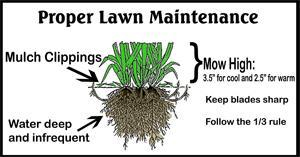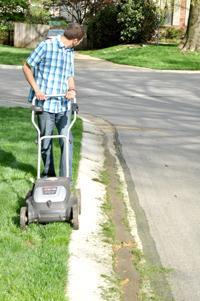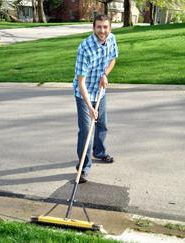Healthy Yard and Environment Tip: May
Proper Lawn Maintenance
Mow it High, Let it Lie

- Keep your mower blades sharp.
- Stick to the one-third rule.
- Never remove more than one-third of the height of the blades at one mowing.
- Leave your grass clippings on the lawn. They return up to 25% of needed nitrogen.
Recommended mowing heights for home lawns:
- Bermudagrass: 1 – 2 inches
- Bluegrass: 2 – 3 inches
- Buffalograss: 2 – 3 inches
- Perennial ryegrass: 2 – 3 inches
- Tall fescue: 2.5 – 3.5 inches
- Zoysiagrass: 1 – 2 inches
Sweep grass clippings off paved surfaces
Clippings that fall on your driveway and sidewalks are more likely to wash into storm drains. Storm drains lead directly to creeks and streams; they are not treated. When grass clippings and yard debris wash into the natural waterways they decompose into nitrogen. Excess nitrogen is not good for water ecosystems. By keeping your grass clippings on your lawn, you are returning that needed nitrogen back to your soil.
Grass clippings are washed away into streams, lakes and eventually oceans. The unnatural levels of nitrogen in the water systems create dead zones that are depleted of oxygen and suffocate marine life. Dead zones form because nitrogen is a food for algae. The algae consume the nitrogen and the abundance of food causes an algae population bloom. Unfortunately, algae also consume copious amounts of oxygen and the depleted oxygen supply leads to a dead zone; a zone where most marine life cannot survive.
 Help do your part: Sweep grass clippings back onto the lawn. It is healthy for your soil and for our environment.
Help do your part: Sweep grass clippings back onto the lawn. It is healthy for your soil and for our environment.
Return to Healthy Yards and Environment
- Kansas Healthy Yards and Communities
- Kansas Healthy Yards Self-Assessment (Find out how you are doing in your landscape)
- Kansas Healthy Yards Videos
Maintaining a Healthy Yard and Environment
Here are some specific tips you can follow each month to make sure your yard is a healthy yard and environment.
- April: Don't Start Watering Lawn Too Early
- May: Proper Lawn Maintenance
- June: Scoop the Poop
- July: Water Your Lawn Correctly
- September: Restoring Your Lawn
- October: Leaves Leaves and More Leaves
- November: End of the Season
- December: Use Ice Melts Sparingly